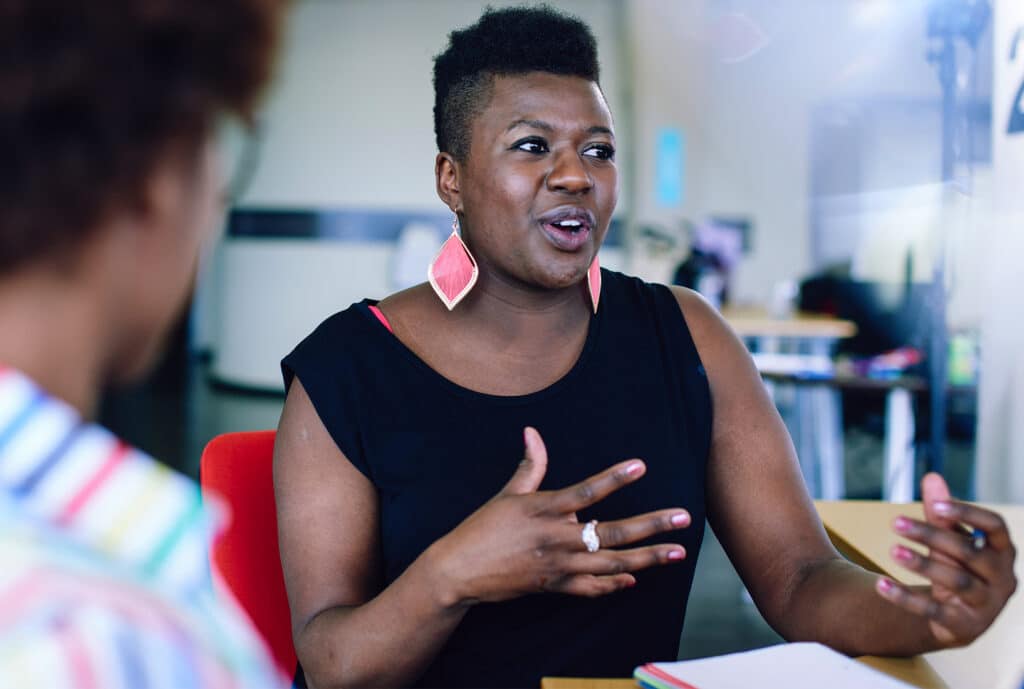In conversation with… Lex Shu Chan, General Counsel The Business of Fashion

The importance of inclusive language in creating a diverse and authentic workforce
There are many aspects to Diversity, Equity & Inclusion (DE&I) and whilst companies have policies in place often, they still struggle to create meaningful change. The topic is vast and can bring up sensitive conversations, but it is important to not be overwhelmed and to instead look at breaking down areas to focus on, acting on these building blocks within your DE&I journey.
Language is one of the most powerful tools we have as humans to build relationships and it is vital for creating an environment where everyone feels welcomed and, able to be their authentic selves. Employees that feel like they belong are more likely to be engaged and motivated at work, therefore we see higher retention rates and increased performance. I decided to explore this area of DE&I during pride month and to discuss the role of inclusive language with Lex Shu Chan, a lawyer with legal experience across international markets and a wide range of corporate cultures in industries ranging from media (fashion, publishing and music) to investment banking who has experienced many workplace environments.
Having studied a Masters of Law (LL.M) from The London School of Economics and Political Science and BA (Jurisprudence) from The University of Oxford, Lex trained at a US law firm and remained for three years as an IP Associate. They then moved to a media law firm for around a year and a half to specialise in film and TV work before moving in-house. They are currently the General Counsel at The Business of Fashion (BoF), and was the inaugural Co-Head of Belong, BoF’s Diversity, Inclusion, Community & Equity ( DICE) Council
I explored with Lex their thoughts on inclusive language, how businesses can start to educate their employees and some of the challenges within the legal sector specifically, for example, the historic use of masculine language. Addressing inclusive language is crucial to increasing the diversity of both the legal industry, and the overall working world, and there are many ways to impact as a lawyer, leader and colleague.
What is inclusive language in a business context?
Language is an incredibly powerful tool, particularly in the legal profession where precision with respect to the use of words (both spoken and written) — or the lack thereof — often spells in the difference between a good or bad deal in a negotiation or winning or losing in litigation. In a similar way, the words we use have the power to imply or express ideas which exclude or offend people on the basis of gender, sexual orientation, age, race, ability or any other characteristic.
On the assumption that most of us don’t wish to deliberately exclude or offend others both in a professional or personal context, it is imperative to understand how to use our words in an inclusive way, and, given that language is constantly evolving, critically examine why we or the industry in which we operate might be resistant to change.
Having worked at various companies that create content, I have been able to collaborate with writers, marketers, designers and other content creators not just on pre-publication libel and rights clearance matters, but also to set guidelines to ensure that the language used is not only clear, appropriate, sensitive and current, but that it also does not feed into or reinforce any systemic biases and inequities.
However, the need to be attentive to detail when it comes to words is not distinct to businesses which consistently publish content since language is everywhere – from day-to-day interactions between colleagues to the contracts we draft, the policies we write, the job specs on our recruitment platforms and the pitches we send. The opportunities for lawyers to be intentionally inclusive with our language in a business context are therefore endless.
Why does inclusive language matter in the workplace?
Being mindful of how we use our words can contribute towards an inclusive and equitable culture. From a personal perspective, I have in the past found myself in business environments where I have experienced how it feels to not be included – it affected my confidence, my voice and my overall ability to be happy. I have also experienced the opposite – how liberating it is not to have to worry about the negative impact of not being included, and how it gave me the space to thrive, so I would regard use of inclusive language as a moral imperative in any business context.
In parallel to the moral case for using inclusive language, it has been proven that belonging uncertainty reduces productivity. There is now so much publicly available empirical evidence on the business benefits of inclusion – whether this is in terms of increasing employee engagement, enhancing creativity and innovation, retention, amplifying the benefits of diversity and a company’s bottom line – that we are past the point of having to prove why we should be building inclusive cultures from a commercial perspective, and of course, inclusive language has a huge role to play.
Finally, most lawyers will be aware of the potential legal, financial and reputational risks associated with misuse of language, as this can result in breaches of policies, employee handbooks and codes of conduct, and of course the Equality Act.
What can corporates do to create inclusive environments in terms of policies?
I would first start by conducting an audit of what policies exist within an organisation. Some policies may not require updating but should be further amplified so folks know where to find them and feel confident that they will be adhered to. There will, however, be policies and processes which require updating. Recruitment is a great example since, without clear guidance on how to draft job descriptions, for example, exclusive language can seep in to introduce biases into the process and reduce your talent pool by deterring potential candidates (e.g. “native English speaker”, “top tier university”, “ninja” etc).
There will also be policies and processes which your organisation may not have, but which should be introduced. The success of diversity and inclusion work is measured by how the most marginalised people in your organisation respond to an initiative and not the majority, which is a foreign concept to a lot of us working within the capitalist structure. It is therefore important to ensure that your policies are responsive to the needs of all employees. For example, many affirming organisations have introduced pronouns guides such that gender-diverse individuals are fully seen, respected and valued. Such guides are important not just for internal communications, but particularly for those in client or customer-facing roles, which applies to a lot of us in the legal profession. For example, it is important not to make assumptions about someone’s gender or pronouns solely by the sound of their voice or a photo, and once you know how an individual identifies, it is important to respect and use the pronouns specified, whether gendered or not.
Companies might also consider introducing broader gender identity and expression policies to ensure gender diversity is respected and recognised, and to cultivate gender literacy throughout the business. This should not only cover guidance on how the company will support employees when it comes to social, procedural and medical transition but also how to use language inclusively and sensitively, for example accommodating the use of a transitioning employee’s preferred name as opposed to their legal name were requested and clarifying how they would like their spouse to be referred to (e.g. partner, husband, wife) rather than making assumptions.
In parallel to policies, training is essential to ensure that there is universal understanding throughout an organisation on what constitutes inclusive language. For example, some terms which may have been used to describe someone’s race or ethnicity in the past may now be considered outdated, and in some cases pejorative and offensive. There are also terms that stem from the context of mental health or disability which, often due to ignorance, are regularly used in conversation, but should only be used appropriately and sensitively. I would recommend that organisations engage subject matter experts to ensure that employees receive regular training on these topics.

The legal profession has a history of using masculine language, how could we make change in the industry for example with precedent templates and correspondence?
Contracts are an archaic construct, and traditionally always use masculine pronouns to refer to any party, often with the caveat that a reference to one gender shall include a reference to the other genders. Words such as ‘chairman’ and ‘keyman’ still frequently appear in contracts and constitutional documentation. Fortunately, there has recently been increasing recognition of the need to adopt gender-neutral drafting. For example, in 2019, the UK Governments Legal Department in putting together this Guide to Gender-Neutral Drafting document, and by way of example, Clifford Chance implemented their Global Policy on Gender Neutral Language in December 2020. Adopting such policies has the effect of affirming gender-diverse employees and clients, as well as signalling an organisation’s values and commitment to inclusion.
As you noted, it isn’t just contract templates which need to be considered. While “Dear Sir / Madam” in letters is fine if we know that is how the recipient identifies when in doubt, use the recipient’s name instead. When addressing gender-diverse groups in team meetings, “hi everyone” may be more appropriate than “hi guys” or “ladies and gentlemen”. There are many ways in which we can adapt the ways we communicate to ensure that it is inclusive for all.
How can leaders help to create change in the legal industry and their own organisations?
For employees with marginalised identities, the impact of bias is very real, and for individuals with privileged identities, allyship is even more of an imperative. While identity is intersectional and none of us are a monolith, being leaders automatically provides certain privileges when it comes to being influential and having the ability to speak up and to advocate. While it is everyone’s responsibility to reflect on how to be better allies, for those in leadership roles, it is doubly important to lean in, speak up for those, not in the room and, most importantly look at why marginalised voices may not be in the room and bring them in. In an inclusive language context for example, if as a leader, you notice a gender-diverse employee being misgendered, it may feel uncomfortable for you to intervene. However, it is especially important for leaders to prioritise practising active allyship over their own comfort, so I would encourage anyone who finds themselves in such a position to “call this in” (more on this later). All leaders also have to make decisions, and because we all have unconscious biases, when we don’t consider our decisions this can lead to inequitable outcomes. I know this is quite a difficult thing to do when working in a fast-paced legal role, but I would advise legal leaders to slow down and practice making objective, equitable decisions. When it comes to making people-related decisions whether recruitment, promotion etc., it is important to reflect on the relevant criteria and apply them consistently. This is where objective processes and policies become very important.
What happens if I get it wrong?
I was introduced to the concept of “calling it in” by the amazing team at Project 23 (a consultancy which helps organisations build diverse and inclusive cultures), which is a more empathetic and compassionate way of calling someone out. This involves sharing your own process and, if you see someone making a mistake, separating the intent of the statement from the impact it has on the offended individual. To those who find themselves in a position of being “called in” for getting it wrong, it is important to embrace and sit with the inevitable discomfort in order to not repeat the same mistake, but also to apologise in a concise, clear and direct way and move on, as labouring the point can put further emotional burden on the offended individual. We will all inevitably get some things wrong as language is ever-evolving, so it is important to know how to respond in such situations.


